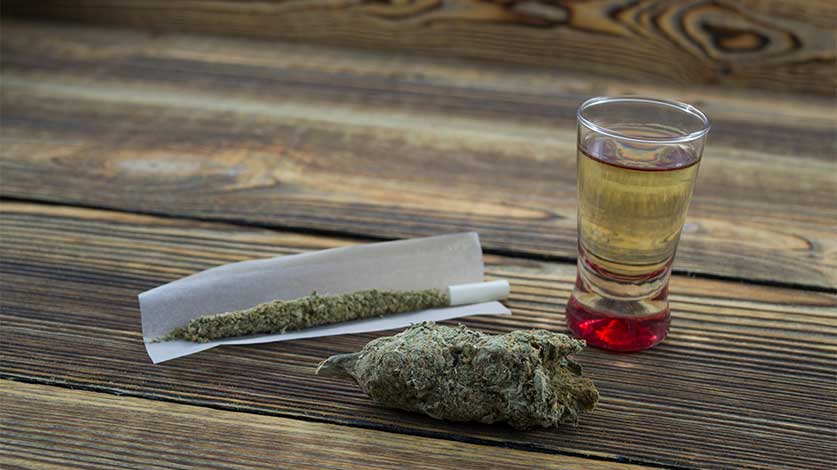Cross-Faded | Effects & Risks Of Being Drunk & High

Medically Reviewed By: Kimberly Langdon, M.D.

Written by: Fikret Terzic MD, MS
Alcohol and marijuana are two of the most popular drugs in Ohio. Some people use them together, which is a practice called crossfading. Crossfading can increase your risk of alcohol poisoning, drug addiction, and other health problems.

Although Ohio has not legalized recreational marijuana (cannabis) use, many Ohio residents regularly engage in it. Some of them combine the drug with alcohol. This trend, which is known as “crossfading,” poses some unique health risks.
What Is Crossfading?
Crossfading means drinking alcohol and using marijuana at the same time. It may involve various types of marijuana use, including joints, edibles, vapes, and bongs.
The term comes from an audio engineering technique that creates a smooth transition between two sounds. The word “cross-faded” describes a person who has become both drunk and high after crossfading.
Effects Of Crossfading
Crossfading has different effects depending on which drug you use first.
Effects Of Using Alcohol Before Marijuana
Drinking alcohol first may enhance the effects of cannabis use, including increased appetite, altered sensory perceptions, and euphoria (intense joy).
It can also increase the drug’s negative effects, such as dry mouth, anxiety, and paranoia.
This is because ethanol (the main ingredient in alcoholic drinks) causes your blood vessels to absorb higher THC levels. THC stands for delta-9-tetrahydrocannabinol, which is the main psychoactive ingredient in marijuana.
Using alcohol before marijuana can also increase your risk of “greening out.” This condition occurs when your body absorbs too much THC. Your brain’s cannabinoid receptors (the receptors affected by cannabis) become overstimulated, which causes unpleasant side effects such as:
- nausea and vomiting
- dizziness
- shaking
- sweating
- chills
- severe anxiety
- panic attacks
- increased heart rate
- shortness of breath
Effects Of Using Marijuana Before Alcohol
While alcohol boosts the effects of marijuana, some studies suggest that marijuana minimizes the effects of alcohol. That’s because marijuana seems to slow the absorption of alcohol into your bloodstream. This means that if you have recently used marijuana, you may need a much larger amount of alcohol before you feel drunk.
In particular, you may engage in binge drinking.
The National Institute on Alcohol Abuse and Alcoholism (NIAAA) defines binge drinking as having 4 or more drinks in about 2 hours for women and having 5 or more drinks in about 2 hours for men. Binge drinking increases your risk of alcohol poisoning (also called alcohol overdose).
Common symptoms of this life-threatening condition include:
- severely lowered inhibitions
- nausea and vomiting
- slow or irregular breathing
- slow heart rate
- sudden drop in body temperature
- pale, clammy, or bluish skin
- memory impairment
- confusion
- seizures
- loss of consciousness
To make matters worse, marijuana is an antiemetic. That means it can prevent you from vomiting, which is how the body expels dangerous amounts of alcohol.
Crossfading may also make you more likely to experience alcohol-related car crashes.
That’s because marijuana can lessen the negative impact that alcohol has on your motor skills, which might make you feel like you can drive after drinking. However, even if you feel fine, your blood alcohol concentration (BAC) may be well over the safe and legal limit.
Crossfading & Addiction
Like other forms of substance abuse, crossfading can lead to addiction, especially if you do it on a regular basis. You may develop symptoms of both alcohol addiction and marijuana addiction.
Alcohol Addiction
Alcohol is one of the most addictive substances in the world. Common symptoms of alcohol addiction include:
- needing increasingly larger or more frequent drinks to feel the desired effects (also called tolerance)
- experiencing unpleasant withdrawal symptoms, such as anxiety and shaking, when you don’t drink alcohol (also called physical dependence)
- experiencing frequent cravings for alcohol
- feeling unable to control your use of alcohol
- losing interest in activities that don’t involve alcohol
- avoiding friends and family to spend more time drinking alcohol
- falling behind at work or school due to frequent intoxication or hangovers
When left untreated, alcohol addiction can lead to other health problems, including depression, heart disease, and certain cancers.
Marijuana Addiction
Some people think marijuana is not addictive. However, many cannabis users develop symptoms of addiction, especially if they started using the drug before age 18.
As with alcohol addiction, the main symptoms of marijuana addiction are cravings, tolerance, and withdrawal symptoms. The most common withdrawal symptoms associated with marijuana addiction include:
- irritability
- mood swings
- reduced appetite
- trouble sleeping
When left untreated, marijuana addiction can have negative cognitive effects, including poor memory, trouble concentrating, and difficulty learning new things. In addition, if you regularly smoke marijuana, you may face a higher risk of lung complications, including pneumonia.
If you or someone you love struggles with crossfading or another type of substance use, please contact Ohio Recovery Center. Our addiction recovery programs offer personalized, evidence-based treatments to help you or your loved one become drug-free.
- Centers for Disease Control and Prevention — Alcohol Use and Your Health https://www.cdc.gov/alcohol/fact-sheets/alcohol-use.htm
- National Institute on Alcohol Abuse and Alcoholism — Understanding the Dangers of Alcohol Overdose https://www.niaaa.nih.gov/publications/brochures-and-fact-sheets/understanding-dangers-of-alcohol-overdose
- National Institute on Drug Abuse — Is marijuana addictive? https://nida.nih.gov/publications/research-reports/marijuana/marijuana-addictive
- Neuropsychopharmacology — Marihuana attenuates the rise in plasma ethanol levels in human subjects https://pubmed.ncbi.nlm.nih.gov/1326277/

